On a recent November evening, Bob Blackman scrolled through his phone in a nondescript Indian restaurant in west London, sparsely decorated except for stock pictures of East African sunsets and lions.
He proudly pointed to his phone’s background photo, which shows him smiling next to Indian Prime Minister Narendra Modi.
“I’ve been to India seven times in the last three years,” Blackman said, sipping a cup of chai, his cheeks flushed from canvassing in the cold, ahead of Britain’s first December election in nearly a century. “I am well-known for being a very pro-Indian supporter.”
Across the table, Kuldeep Singh Shekhawat, the head of a UK-based pressure group linked to Modi’s Bharatiya Janata Party (BJP), chimed in: “A hundred percent.”
Blackman is a three-term member of Parliament for Harrow East, a racially and religiously diverse constituency where 28.2% of the residents are Hindu. The Conservative Party politician has a track record of championing Indian – more specifically, Hindu – concerns.
Brexit and healthcare are the dominant issues in this campaign, but Shekhawat is hoping that a geopolitical crisis some 4,000 miles away will play a decisive role in swinging this tightly-contested seat in Blackman’s favor.
Shekhawat’s organization, the Overseas Friends of BJP UK (OFBJP), is among dozens of Hindu groups in the UK that are calling on 1.4 million British Indians to turn their backs on the main opposition Labour Party, over its criticism of Modi’s crackdown on the Indian-controlled part of the disputed Kashmir region.
The intrusion of the Kashmir issue on the campaign trail has stirred tensions at a time of rising fears of foreign influence on elections everywhere.
Critics in the UK say Modi’s tactics in India – promoting a nationalist Hindu agenda at the expense of the country’s diverse minority groups – are now being exported by his supporters around the world. The activities of the OFBJP, which has roughly 40 chapters globally, are often coordinated by the external affairs department of Modi’s party.
And while analysts say it is unlikely that the Hindu nationalist groups’ strategy will change many minds in Britain, for Shekhawat, every vote is important in what is expected to be a close election.
Skyrocketing tensions
India and Pakistan have been fighting over Jammu and Kashmir ever since both countries gained independence from British colonial rule in 1947. Both nations claim the disputed region in full.
In August, India stunned the world by stripping Jammu and Kashmir – India’s only Muslim-majority state – of its partial autonomy, sparking outrage in Pakistan and raising tensions between the two nuclear rivals. Communications have been suspended, politicians have been jailed and civil rights curtailed, leading to fears for ordinary Kashmiris.
The crisis also struck a raw nerve in Britain; the two largest minority ethnic groups in England and Wales are Indian and Pakistani, respectively. In London, thousands of people demonstrated outside India’s High Commission.
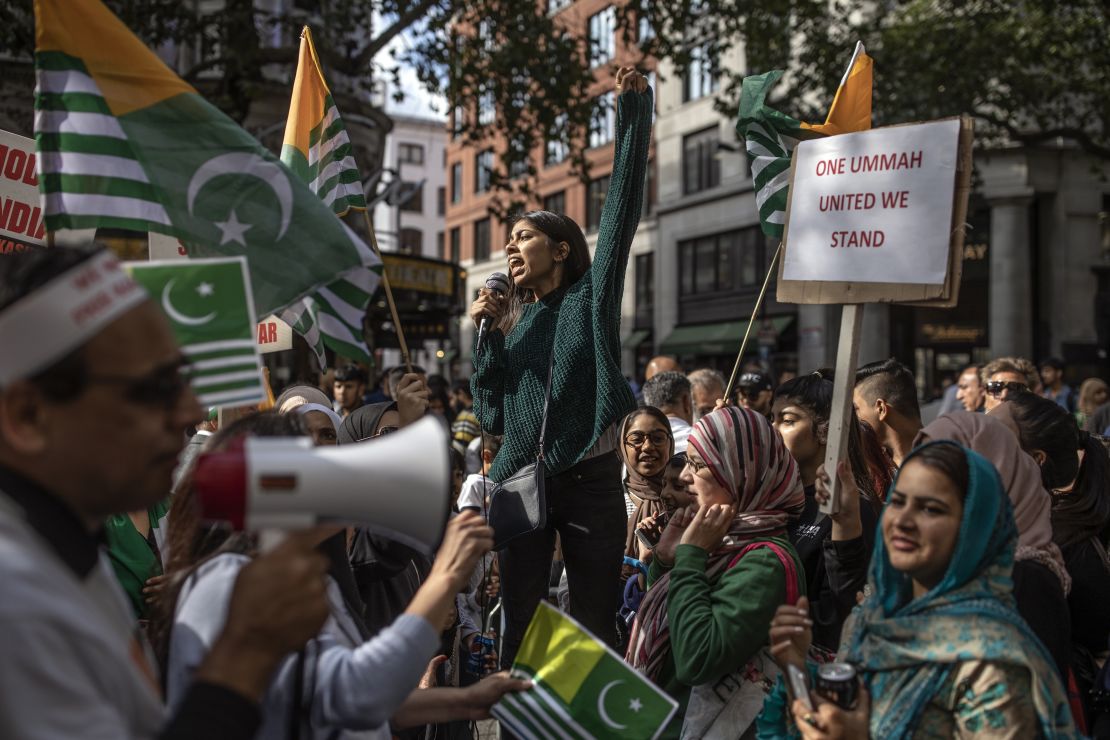
In late September, during its annual conference, the Labour Party passed a motion criticizing India’s moves in Kashmir as “human rights violations” and declaring that people in the region should be given the right to self-determination. India’s foreign ministry reacted with outrage, accusing Labour of “pandering to vote-bank interests.”
Earlier this month, Labour revised its position on Kashmir, announcing in a letter from the party’s chairman that the issue was “a bilateral matter for India and Pakistan” to solve and warning that the issue “must not be allowed to divide communities against each other here in the UK.” But the party’s U-turn failed to quell the outrage from UK-based Hindu groups.
“The issue here is Jeremy Corbyn [the Labour Party leader] is anti-India and anti-Hindu,” Trupti Patel, the president of the Hindu Forum of Britain, an umbrella group representing Hindu organizations in the UK, told CNN.
“If you want to play the politics of voting blocs, then let’s play the politics of voting blocs,” Patel said, adding that the Hindu Forum would be pushing Hindus to vote for anyone but Labour.
A Labour Party spokesperson told CNN that “we hugely value and respect the British Indian community” and that people of Indian origin “are active right throughout the Labour movement.”
But Labour has also been criticized for failing to shortlist more British Indians in target seats, especially in areas with large South Asian communities such as Leicester, Ealing, and Ilford.
Former Labour councilor and Parliamentary candidate Sundip Meghani, who lost the selection process in Leicester East, said the decision to choose a non-South Asian candidate was a “kick in the face” to “one of the most prominent South Asian constituencies in the country.”

“They [the Labour Party] did it with the Jewish community, and it is now doing it with the Indian community: taking loyal, solid voters for granted,” Meghani told CNN, referring to criticism over Labour’s handling of a recent wave of anti-Semitic incidents within the party.
A Labour spokesman told CNN that its new candidate, Claudia Webbe, is “proud to be Leicester-born and bred, and honored to be representing the community where her family still live.”
‘Receptive of Indian concerns’
Surveys show that minorities overwhelmingly support the Labour Party, which has traditionally gained the lion’s share of the vote among British Pakistanis and Indians. But the Conservatives have seen their vote share increase among the latter, specifically among Hindus, according to a report by race equality think tank, the Runnymede Trust.
Bob Blackman has worked hard to target Hindus with appeals to nationalist causes on the subcontinent. Blackman’s own position on Kashmir – that it belongs to India – is a position that “really unites every Indian,” he said.
“Jammu and Kashmir is an integral part of India, and the illegal occupation by Pakistan on parts of sovereign India should end,” Blackman said. [Kashmir] is a minority issue, but it’s an important minority issue.”
Closer to home, he told CNN, the Conservative values of “hard work, entrepreneurship, standing on your own two feet, and not relying on state benefits” are reflected in Britain’s Indian community.
When asked to clarify whether he meant to say British Hindus, he replied: “Yeah, Hindu values.”
“I think it’s true for Muslims as well, Indian Muslims,” he added. “I don’t differentiate between the two.”
Shekhawat, from the OFBJP UK, said the Hindu organizations will target around 40 marginal seats that “are more receptive of Indian concerns” to vote for the Conservatives, though he and the leaders of other groups struggled to explain how the targeting will actually work.
“We have not got a strategy as such,” said Patel from the Hindu Forum. She said that members, in their personal capacity, would canvass for Conservative candidates around the country.
A good example, said Shekhawat, is the marginal seat of Canterbury, which Labour won by 187 votes in 2017. “If there are 200 Indians living there and they vote Conservative, the seat could be called,” he said.
From the BJP playbook
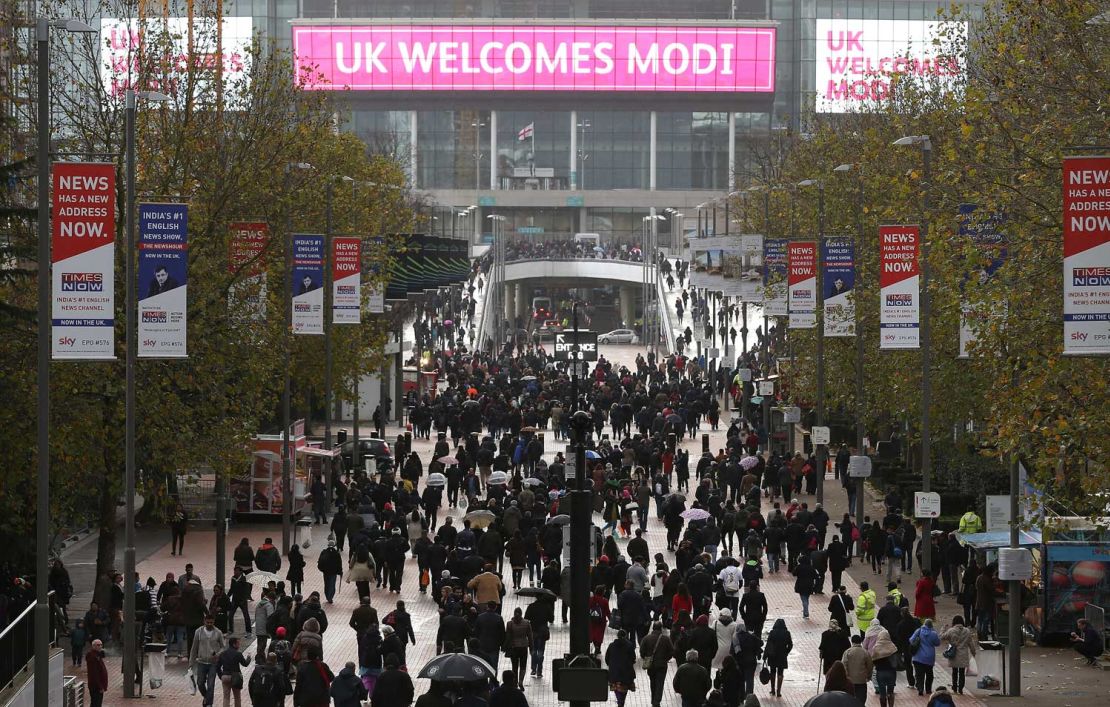
Modi’s Bharatiya Janata Party swept to power in 2014 on a rising tide of Hindu nationalism that has spread across India in recent years, and the OFBJP has become a key tool in his diaspora diplomacy.
The group’s UK chapter helped organize the Prime Minister’s visit to London in 2015, when some 60,000 British Indians packed Wembley Stadium for a rally in his honor, along with a second trip last year.
One anti-racism group that has investigated the activities of Hindu nationalists says Shekhawat’s efforts are a prime example of how the BJP’s interests are amplified in the UK.
Suresh Grover, a human rights campaigner and director of the Monitoring Group, said OFBJP branches were established in the US and UK to “regularly discuss how to popularize BJP policies overseas, including changing the UK’s perception of Modi himself.”
“They [the BJP] are very, very sensitive to how the British Parliament or the American Senate look at issues of democratic rights in India or religious freedom … That is where the Kashmiri issue comes in,” he added.
Shekhawat denied that the OFBJP UK is essentially the British wing of Modi’s party. “We are not BJP … we are just a pressure group,” he said.
But there are links between the two. The BJP’s foreign affairs chief in New Delhi, Vijay Chauthaiwale, was described as the chief of the OFBJP in a post on the OFBJP UK website in March 2017. The post republished an article written by the Sunday Business Standard newspaper in India, which asked Chauthaiwale what his plans were for the group.
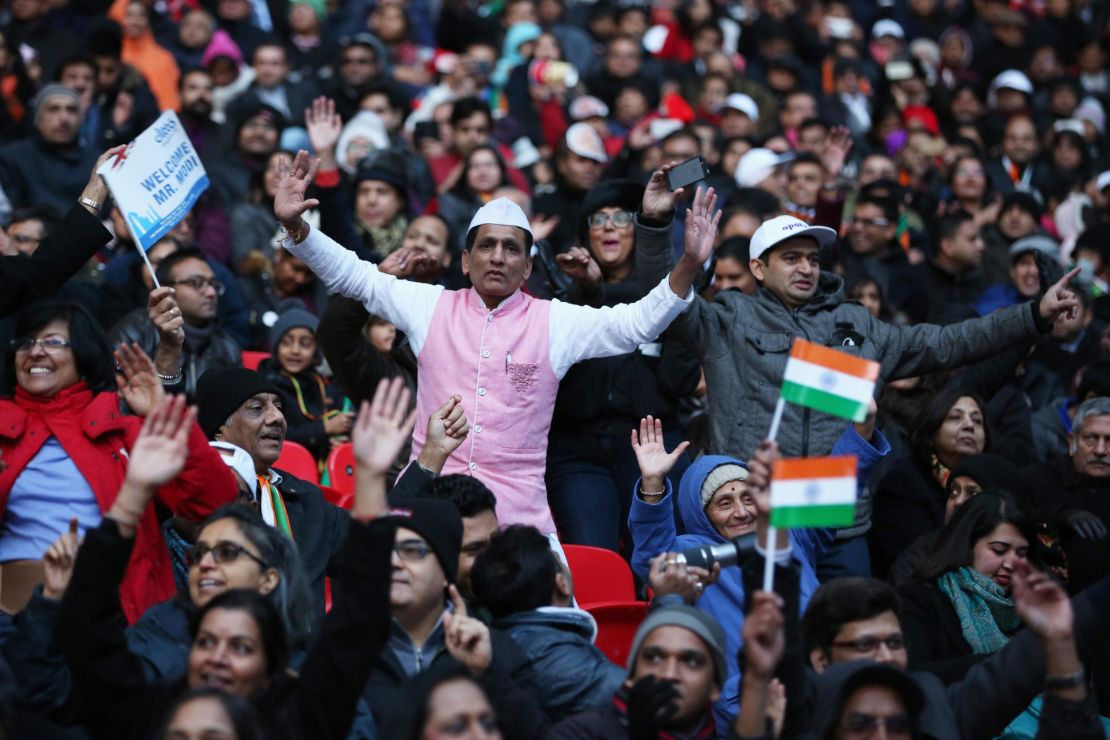
“We are also encouraging — and we plan to pursue this more aggressively in the months to come — the Indian diaspora to become part of [Modi’s] social programs,” he told the paper in 2017.
When contacted by CNN, Chauthaiwale declined to say whether he was still the head of the OFBJP globally. He acknowledged that he coordinates “the activities of Overseas Friends of BJP on behalf of the party,” but said that “each unit is independent.”
Charles Parton, a former diplomat and senior associate fellow at the Royal United Services Institute (RUSI) think tank, said the pressure group’s campaign would not amount to foreign interference as long as it was run by British citizens and not financed by a foreign government.
“If the Overseas Friends of the BJP are UK citizens, self-funded, then they have a right to urge other UK citizens to vote for ‘Party X or ‘Party Y’,” Parton told CNN.
The BJP has denied financial links to OFBJP UK or any Hindu organization in Britain. “We as [the] BJP have no stakes in the UK elections. We are, of course, watching the UK elections with keen interest and what its impact will be on India-UK relations,” Chauthaiwale told CNN.
Others have accused Hindu groups – and Blackman himself – of finding common cause with Islamophobes and other extremists.
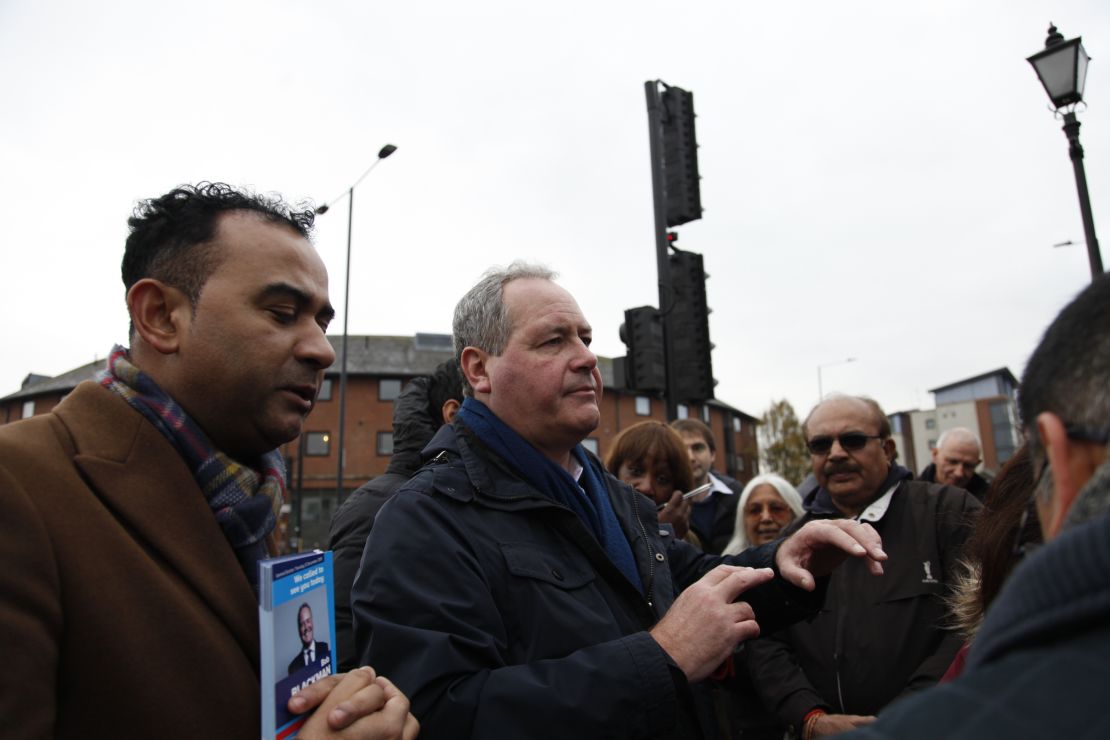
Blackman was accused earlier this year of being a member of far-right and Islamophobic Facebook groups, and sharing an anti-Muslim post by far-right activist Tommy Robinson, in a letter by the Muslim Council of Britain to the UK’s human rights watchdog. Blackman repeatedly denied being Islamophobic, has said he joined the groups by accident, and told Channel 4 that he did not know it was Robinson who had shared the post.
Blackman was also criticized for co-hosting a Diwali event in Parliament in 2017 which featured far-right Hindu activist Tapan Ghosh, who has appeared in an interview with Robinson, as the keynote speaker.
The Conservative candidate denied inviting Ghosh and insisted he “did not agree with his views.”
Blackman firmly denies that his pro-India stance on Kashmir is another expression of anti-Muslim sentiment. “It’s not Islamophobic, far from it. It is a case of representing everyone,” he said.
Historical precedent
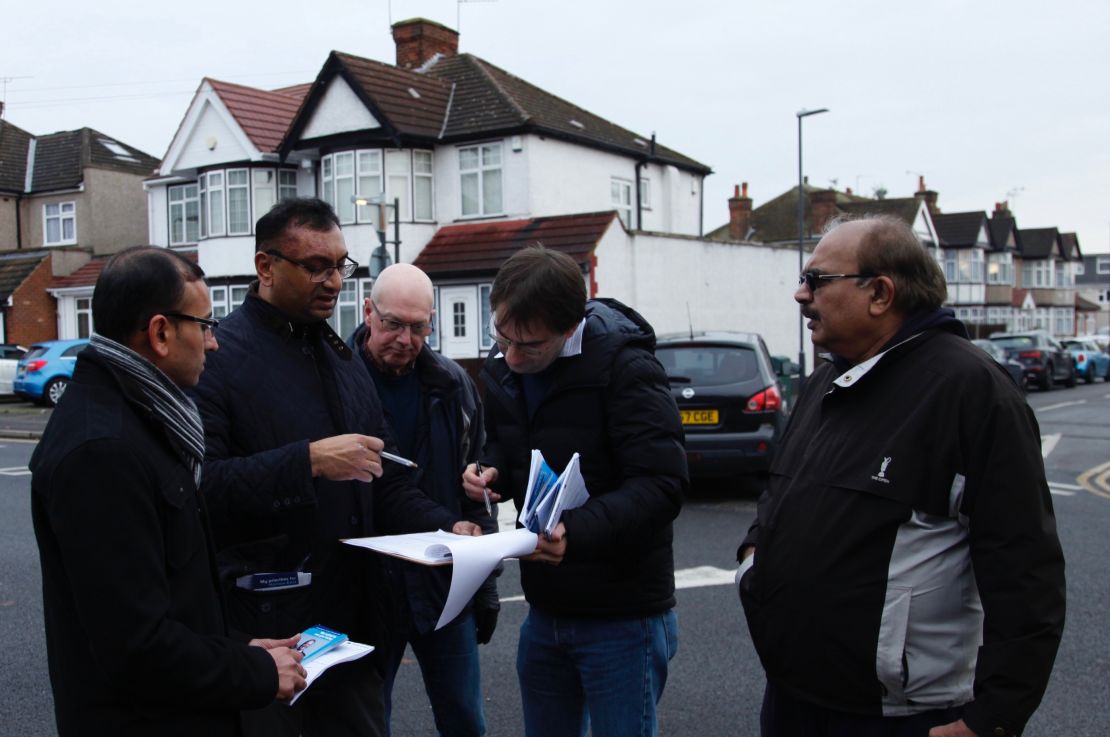
It will be an uphill climb for Blackman and other pro-India candidates to win the Indian diaspora over, especially when only 44% of 1.4 million British Indians identify as Hindu.
“The Conservative Party is only half as likely to win an ethnic minority vote as a white British voter,” and it is not because of the education level or socio-economic position of ethnic minorities, it’s “despite it,” Sunder Katwala, the director of British Future, a think tank specializing in integration and migration, told CNN.
There are historical precedents as to why, say experts. In the 1960s, Enoch Powell, a Conservative MP, caused a political storm over an anti-immigration speech he made as the Labour government was attempting to pass the country’s first-ever race relations legislation. And in 1990, Conservative party grandee Norman Tebbit suggested to the Los Angeles Times that the loyalty of British Asians could be tested by which cricket team they supported.
Recent scandals may also see the Conservatives, “from a very low base, go backward with black and Muslim voters,” Katwala added. These include allegations of Islamophobia in the Conservative Party, and what’s seen as a lingering anti-immigrant legacy, dating back to former Prime Minister Theresa May’s “hostile environment” policy towards immigrants.
But Britain’s minorities do not vote homogenously, according to experts on voting behavior who said there was little evidence that foreign policy issues like Kashmir will compel them to switch parties.
“Your views about an issue like Kashmir or an issue like Palestine might feed your world view, but voters, on the whole, don’t vote on foreign policy issues,” Katwala said, citing a systematic study on minority voting behavior, the 2010 Ethnic Minority British Election Survey.
One of its authors, Maria Sobolewska, professor of political science at the University of Manchester, described the Hindu nationalist strategy as “hot air.” British Indians are most likely, compared to other ethnic minorities, to say “religious institutions should not meddle in politics,” she told CNN, citing her research into the role religion plays in political mobilization.
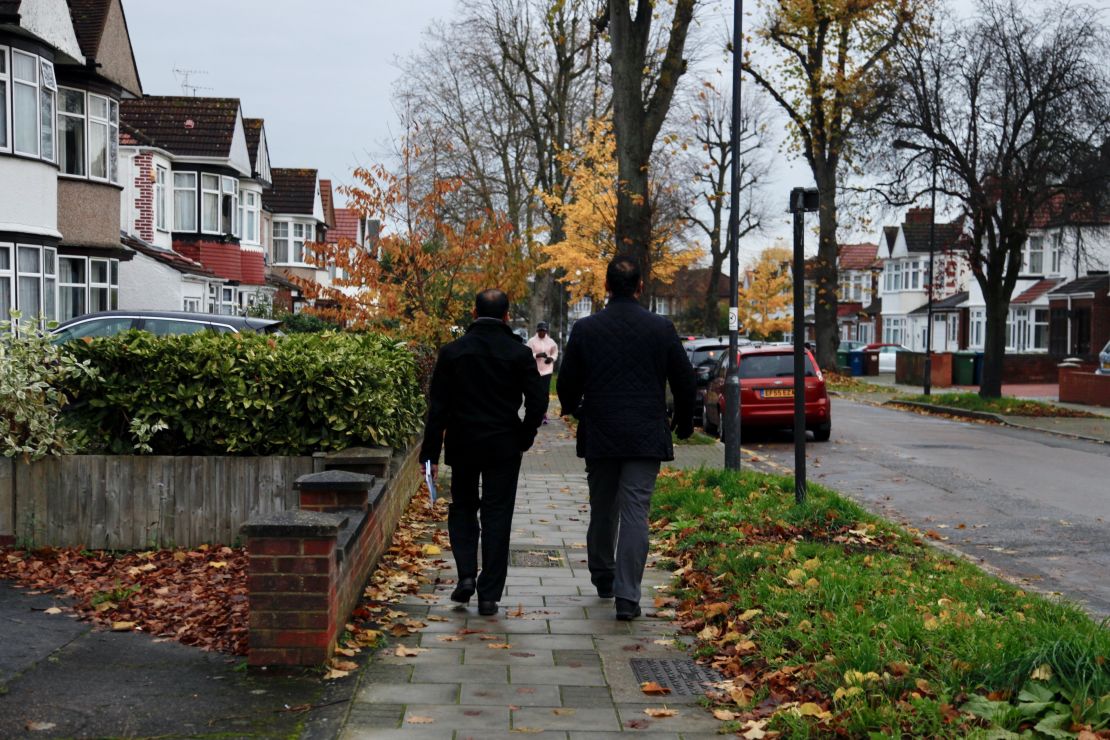
Nor would seat targeting be a nationally viable electoral strategy, according to Omar Khan, head of the Runnymede Trust. “In all of Britain, there are around 15 seats where Indians are even 15% of the population, so there’s not enough to swing it,” (to a large Conservative majority), Khan said.
“To me, it does not look like an electoral strategy, it signals to British Asians that you must be a Hindu nationalist to be a proper Indian,” Khan added.
That antipathy towards foreign policy influencing their vote was evident among Blackman’s constituents on a cold morning in Harrow in mid-November as Conservative campaign volunteers approached the mid-century terraced homes that ringed a local park.
Bundled up in a sweater, Priti, a Hindu mother-of-two who refused to give her full name, said she planned to vote Conservative, but that it had nothing to do with Kashmir.
“No one has spoken about it and what you have to consider is most people worry about what happens locally,” the 48-year-old, who backs the Conservatives’ Brexit position, said. “Not something that is so far away.”
After a spirited debate with a Conservative volunteer, Shahid-Abbas Jaffer, a 20-year-old British Indian student who is Muslim, told CNN that Kashmir was not a “make or break issue” for him. He said he will vote Labour and he wants a second referendum on Brexit.
That does not stop Blackman, because every issue is a potential pathway to holding onto his seat. After posing for a group picture, Blackman told volunteers to target “certain doors” and convince voters to get out to the polling stations on election day.
And how does one do that, asked one volunteer?
Remind them what the critical issues are, Blackman replied. “Is it Brexit; is it to do with the economy, or is it something about India, like Jammu and Kashmir?”
Tara John reported and wrote from London. Swati Gupta reported from New Delhi.























